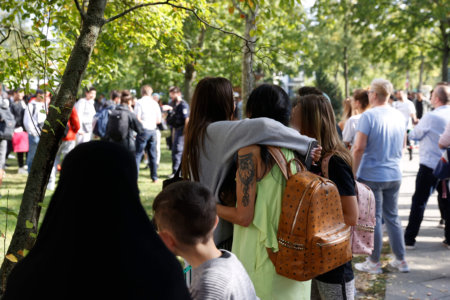
Small talk can be a pain, especially at events where you don’t know anyone.
Learning how to be more sociable isn’t just an introvert’s nightmare, some extroverts may find it tricky to navigate around larger social settings too.
Although talking to strangers can be awkward, there is an art to it, and it can be mastered.
While small talk may seem superficial at best, it actually carries social value.
Anthropologist, Dr. Bronisław Malinowski described small talk as the language used in free, aimless, social interactions.
Hence, the purposeless expressions of “How’s the weather?” and obvious accounts of happenings.
But these little pockets of conversations serve as an entrée to open up the doors to potential friendships, relationships or even business opportunities.
Think of small talk as a spoken smile or a verbal handshake. Essentially, we engage in small talk with the intention of connecting with others.
“A golden rule is that you don’t have to be brilliant―just nice,” says Bernardo J. Carducci, director of the Shyness Research Institute at Indiana University Southeast.
“If you start with simple, even obvious comments, that makes it easier for others.”
Small talk isn’t the most stress-free activity but it can be fun with the right attitude! You’ll never know whom you’ll meet or what they have to share.
Here’s how to master the art of small talk and learn how to be more sociable with these four simple tips:

Small talk carries social value and we engage in small talk with the intention of seeking connection with others. Source: Ethan Miller/Getty Images North America/Getty Images via AFP
Focus on learning names
It doesn’t matter if you know small talk or not when you don’t make the effort to learn people’s names.
Slow down introductions to make it easier for your brain to process information. One way to do this is to repeat a name once or twice after hearing it.
This works especially when someone has a unique name. Take your time to really make it stick in your head.
You can say something along the lines of “I’m sorry. Let me try that. Did I get it right?”
If someone mumbles their name, ask them to repeat themselves.
It may seem small but it shows that you’re genuinely trying to make an effort to learn how to be more sociable.
In case you find yourself forgetting a name, discreetly ask a third party for help or listen for it in conversation.
But if all else fails, come clean. No one’s going to be mean about it especially if you’ve gone around introducing yourself to 20 people at a time.
Ask open-ended questions
Having a few questions up your sleeve will give you something interesting to share on the fly. You can always start with open-ended questions.
These generate a more interesting, dynamic conversation and encourage the person you’re speaking with to open up.
“If you comment on the good music or the interesting floral arrangements or how long a food line is, and the other person agrees, that means they’re willing to talk to you,” Carducci shares.
Some other fail-safe questions include:
- “Are you having a nice time?”
- “Where are you from?”
- “Do you know anyone here?” or “How do you know the host?”
Alternatively, if you’re attending an event where you’ve met some of these people before, ask about the previous times you’ve met.
You might say “As I recall, the last time I saw you, you were applying for a new job. How did that go?”
And you could follow up by asking about their new job and how they’re liking it so far. From there, pay attention to their responses and move between topics.
Engage in empathetic listening
Part of learning how to be more sociable includes being a good listener and being enthusiastic about knowing more about other people.
One way to do this is by actively engaging in conversation and repeating back what you understood.
People love talking about themselves so show interest and ask questions along the way.
Create a safe space
Conversations should allow both parties to freely express themselves and their experiences without being judged.
If someone told you in confidence a personal experience, listen and validate their experience. Remember, they trusted you enough to open up.










